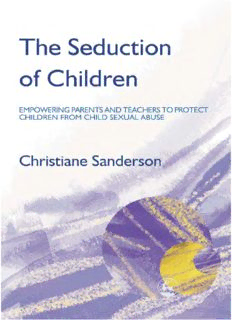
The Seduction of Children: Empowering Parents and Teachers to Protect Children from Child Sexual Abuse PDF
Preview The Seduction of Children: Empowering Parents and Teachers to Protect Children from Child Sexual Abuse
The Seduction of Children of relatedinterest Counselling Adult Survivors of Child Sexual Abuse, second edition ChristianeSanderson ISBN1853022527 Child Abuse and Child Abusers ProtectionandPrevention EditedbyLorraineWaterhouse ISBN1853024082 Creating a Safe Place HelpingChildrenandFamiliesRecoverfromChildSexualAbuse NCHChildrenandFamiliesProject ISBN1843100096 Creative Responses to Child Sexual Abuse, revised edition ChallengesandDilemmas EditedbySueRichardsonandHeatherBacon ISBN1843101475 Narrative Approaches to Working with Adult Male Survivors of Child Sexual Abuse TheClients’,theCounsellor’sandtheResearcher’sStory KimEtherington ISBN1853028185 Announcing CopingwithSurvivorsandSurviving JulieSkinner ISBN1853028223 Sexual Abuse: The Child’s Voice PoppiesontheRubbishHeap MadgeBray ISBN1853024872 Managing Child Sexual Abuse Cases BrianCorby ISBN1853025933 The Seduction of Children Empowering Parents and Teachers to Protect Children from Child Sexual Abuse Christiane Sanderson Jessica Kingsley Publishers London and Philadelphia Figures 3.1 and 3.6 from Sullivan, J. and Beech, A. (2003) ‘Are collectors ofchild abuse images a risk to children?’ A. MacVean and P. Spindler inPolicing Paedophiles on the Internet(pp.12 and 16). Reprinted with permission ofthe New Police Bookshop Publisher. Figures 3.3, 3.4 and 3.5 from ‘Patterns ofsex offenders and strategies for effective assessment and intervention’ andTable 3.2 from Print, B. and Morrison, T. (2002) ‘Treating adolescents who sexually abuse others’, both in C. Itzin,Home Truths about Child Sexual Abuse: Influencing Policy and Practice. A Reader. Reprinted with permission ofThomson Publishing Services. Extract on pp.159-162 from O’Connell, R. (2003)A Typology ofChild Cyber Sexploitation and Online Grooming Practices(pp.8-13). Reprinted by permission ofR. O’Connell, Cyberspace Research Unit. Diagnostic criteria for posttraumatic stress (pp.209-210) reprinted with permission from theDiagnostic and Statistical Manual ofMental Disorders, Text Revision, © 2000 American Psychiatric Association. Table 6.1 from Finkelhor, D. and Browne, A, (1994) ‘The traumatic impact ofchild sexual abuse: a conceptualization’American Journal ofOrthopsychiatry 55.Reprinted with permission. Figure 6.1 from Bentovim, A. (2002) in V. Sinason,Attachment, Trauma and Multiplicity: Working with Dissociative Identity Disorder(p.28). Reprinted with permission ofThomson Publishing Services. Boxed text on p.224 from Stop it Now! UK and IrelandChild’s Play? Preventing Abuse Among Children and Young People.Reprinted with permission ofStop it Now! UK and Ireland. All rights reserved. No part ofthis publication may be reproduced in any material form (including photocopying or storing it in any medium by electronic means and whether or not transiently or incidentally to some other use ofthis publication) without the written permission ofthe copyright owner except in accordance with the provisions ofthe Copyright, Designs and Patents Act 1988 or under the terms ofa licence issued by the Copyright Licensing Agency Ltd, 90 Tottenham Court Road, London, England W1T 4LP. Applications for the copyright owner’s written permission to reproduce any part ofthis publication should be addressed to the publisher. Warning: The doing ofan unauthorised act in relation to a copyright work may result in both a civil claim for damages and criminal prosecution. The right ofChristiane Sanderson to be identified as author ofthis work has been asserted by her in accordance with the Copyright, Designs and Patents Act 1988. First published in the United Kingdom in 2004 by Jessica Kingsley Publishers 116 Pentonville Road London N1 9JB, UK and 400 Market Street, Suite 400 Philadelphia, PA 19106, USA www.jkp.com Copyright © Christiane Sanderson 2004 Second impression 2005 Library ofCongress Cataloging in Publication Data Sanderson,Christiane. Theseductionofchildren:empoweringparentsandteacherstoprotectchildrenfromchildsexualabuse/Christiane Sanderson.--1stAmericanpbk.ed. p.cm. Includesbibliographicalreferencesandindex. ISBN1-84310-248-X(pbk.) 1. Childsexualabuse--GreatBritain.2. Childsexualabuse--Prevention. I.Title. HV6570.4.G7S352004 362.76'72--dc22 2004003207 British Library Cataloguing in Publication Data A CIP catalogue record for this book is available from the British Library ISBN-13: 978 1 84310 248 9 ISBN-10: 1 84310 248 X ISBN pdfeBook: 1 84642 060 1 Printed and Bound in Great Britain by Athenaeum Press, Gateshead, Tyne and Wear For Maxie Contents ACKNOWLEDGEMENTS 9 Introduction 11 Chapter 1. What is Child Sexual Abuse? 31 Chapter 2. The Development of Children’s Sexuality 55 Chapter 3. Child Sexual Abusers 81 Chapter 4. Child Sexual Abuse and the Internet 128 Chapter 5. The Grooming of Children 165 Chapter 6. The Impact of Child Sexual Abuse on the Child 191 Chapter 7. The Signs and Symptoms of Child Sexual Abuse 222 Chapter 8. Understanding the Sexually Abused Child 249 Chapter 9. Protecting Children from Child Sexual Abuse in the Community 272 Chapter 10. The Prevention of Child Sexual Abuse 303 APPENDIX1.USEFULWEBSITES 331 APPENDIX2.GLOSSARYOFINTERNETTERMS 336 REFERENCES 340 SUBJECTINDEX 346 AUTHORINDEX 352 Listof tables Table 1.1 Child prostitution worldwide 41 Table 2.1 Summary of sexual development and sexual behaviour in pre-school age children, 0–4 years of age 68 Table 2.2 Summary of sexual development and sexual behaviour in school age children, 5–12 years old 70 Table 2.3 Summary of sexual development and sexual behaviour in adolescents/teenagers, 13–16 years old 72 Table 2.4 Summary of parental reactions to children’s sexual expression and sexual behaviour 74 Table 3.1 Preconditions for sexual abuse 94 Table 3.2 Summary of typology of paedophiles, adapted from Wyre (1987) 102 Table 3.2 Predisposing factors in adolescents who sexually abuse children 122 Table 4.1 A typology of paedophile picture collections 134 Table 6.1 Traumagenic dynamics of the impact of child sexual abuse 217 Table 8.1 Common examples of paedophiles’ manipulation of children 255 Listof Figures Figure 3.1 Sexual arousal cycle 86 Figure 3.2 Cycle of sexual offending 87 Figure 3.3 The continuous cycle 88 Figure 3.4 The inhibited cycle 88 Figure 3.5 The short circuit cycle 89 Figure 3.6 The spiral of abuse 90 Figure 6.1 Fear and anxiety, along with the child’s inability to control events, lead to two distinct outcomes 220
